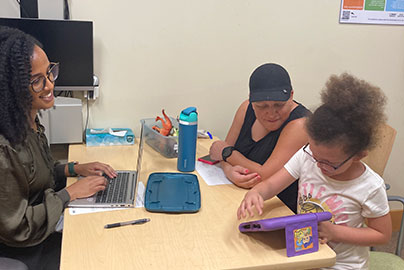Genomic Medicine Clinic
Genomic Medicine Clinics
-
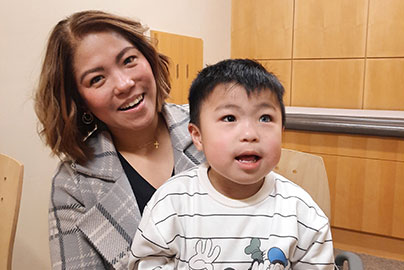
Genomic Medicine - General Genetics Clinic
The general genetics clinic at the UC Davis MIND Institute provides evaluation, diagnosis, management and genetic counseling for patients ranging from infancy into adulthood with suspected or confirmed genetic disorders. The team of expert providers offer a comprehensive range of genetic diagnostic tests to identify a genetic disorder based on the patient’s presenting features.
New patients are seen for initial genetics evaluation based on personal history of complex medical concerns that are suggestive of a genetic etiology, including but not limited to: developmental delays, autism, seizures, hearing loss, and birth defects. Patients with family histories of known genetic disorders are evaluated in a targeted approach specific to the known family history.
The UC Davis general genetics clinic continues to follow patients long term as the field of genetics knowledge and testing continues to evolve and expand. We see patients both in person and by telemedicine, depending on reason for referral. Virtual visits can be done using MyUCDavisHealth video visit or secure Zoom video visit.
-
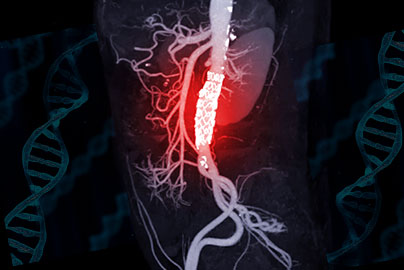
Cardiovascular Genomic Medicine Clinic
This clinic provides access to an M.D. geneticist and licensed and certified genetic counselor who work in tandem to provide education on genetic contributions to cardiovascular disease, reviewing medical history, obtaining family history and assessing how inherited cardiovascular conditions may impact the patient and their family. The geneticist performs a physical exam to allow for evaluation for a syndromic presentation (additional features present in the patient that are outside the cardiovascular system, that have the same underlying cause). Topics of discussion often include: when genetic testing may be helpful (or when it would not), who in the family may be best to start the genetic testing journey, which genetic test would be most informative, interpreting and reviewing genetic test results, as well as providing support and/or resources.
Common cardiovascular clinical indications for referral include personal or family history of: cardiomyopathy (hypertrophic, dilated, arrhythmogenic, left ventricular non compaction), transthyretin (TTR) cardiac amyloidosis, arrhythmias (Long QT syndrome, Brugada, CPVT), thoracic aortic aneurysms and dissections, familial hypercholesterolemia, early sudden cardiac death, and left sided congenital heart defects (bicuspid aortic valve, coarctation of the aorta, hypoplastic left heart syndrome).
Topics of discussion often include:
- When genetic testing may be helpful (or when it would not)
- Who in the family may be best to start the genetic testing journey
- Which genetic test would be most informative
- Interpreting and reviewing genetic test results
- Providing support and/or resources
-

Genomic Autism and Neurodevelopmental Disabilities
The Genomic Autism and Neurodevelopmental Disabilities Clinic at the UC Davis MIND Institute specializes in the diagnosis and treatment of rare genetic conditions that are associated with autism and other related neurodevelopmental disabilities. We aim to provide high quality and equitable care that supports the health and well-being of individuals with neurodevelopmental disabilities. During a new patient evaluation, the family will meet with a geneticist and genetic counselor to review the patient’s medical, developmental, and family history, conduct a thorough physical examination, and discuss diagnostic genetic testing.
Patients are offered follow up appointments to review test results, discuss the next steps in evaluation and treatment, provide genetic counseling, and address counseling. We also offer consultation for patients with are diagnosed with a rare genetic condition who also have autism and/or other neurodevelopmental disabilities to provide management recommendations aimed at optimizing an individual’s healthcare.
-
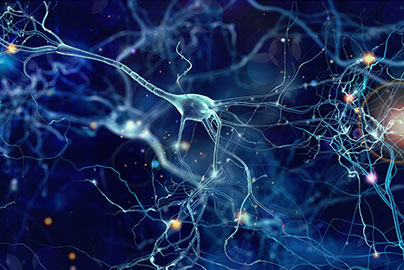
Lysosomal Storage Disorders Clinic
UC Davis Medical Center provides diagnostic, evaluation, management, and treatment services for patients diagnosed with rare Lysosomal Storage Diseases such as Pompe, Fabry, Gaucher, Hurler’s, Hurler-Scheie Syndrome, Hunter, and Maroteaux-Lamy syndrome. Lysosomal storage disorders are inherited metabolic conditions characterized by an abnormal build-up of various toxic materials in the body’s cells, as a result of enzyme deficiencies. Over time, excessive amounts of the toxic materials accumulate and cause damage to the involved systems and organs in the body.
Enzyme Replacement Therapy is a treatment option for those affected with certain types of Lysosomal storage disorders and is available at UC Davis Medical Center, coordinated by the Enzyme Replacement Therapy Program team. For information on the Enzyme Replacement Therapy Program, please call 916-703-0300.
-
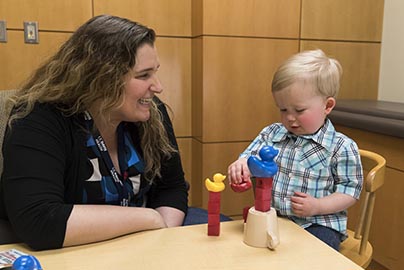
Metabolic Genetics Clinic
The Metabolic Genetics Clinic at UC Davis Medical Center provides comprehensive diagnostic, evaluation, and management services for patients with inborn errors of metabolism, from birth throughout adulthood. Inborn errors of metabolism are genetic conditions characterized by problems converting food into energy, usually due to deficiency of an enzyme.
Treatment often includes strict dietary management, and may include special emergency treatment in case of illness. Regular providers in this clinic include Madelena Martin, M.D., biochemical geneticist; Ayaka Suzuki, M.S., M.G.C., genetic counselor; Staci Collins, R.D., C.N.S.C., dietitian; Laura Dennis, R.D., dietitian; and Cynthia Reynoso Trujillo, M.S.W., L.C.S.W., social worker.
-

Neuromuscualr Genomic Clinic
The Neuromuscular Genomic Clinic program offers genetic services to individuals with inherited neuromuscular conditions, including muscular dystrophies, myotonias, inherited neuropathies and congenital myopathies. The clinic provides comprehensive evaluation including medical history review, assessment of currently available genetic testing options, and results discussion with counseling considerations for patient and family. We work to provide patients and their families information about the genetics of their condition and options for potential future treatments.
Regular providers in this clinic include geneticist Joseph Shen, M.D., Ph.D., and genetic counselor Alena Egense, M.G.C., C.G.C.
-
NF/Ras Pathway Clinic
Learn about the NF/Ras Pathway ClinicThe UC Davis NF/Ras Pathway Clinic provides comprehensive health care support and management for children and adults throughout their life span who have or are at risk for having a Ras pathway condition. We have an expansive NF/Ras pathway referral network consisting of many specialists at UC Davis who have expertise in Ras Pathway conditions. These specialists include dermatologists, developmental pediatricians, gastroenterologists, gynecologists, hematologists, nephrologists, neurologists, neurosurgeons, obstetricians, oncologists and others.
-
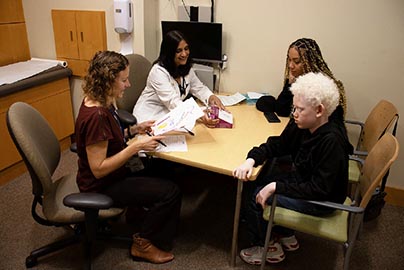
Ocular Genomics Clinic
The goal of this program is to provide genetic services to individuals with inherited eye diseases. We are interested in helping individuals and families obtain precise diagnosis by identifying the underlying cause of their eye condition, understand the inheritance pattern, and learn about options for potential future treatments. The clinic promotes translational research with an ultimate goal of preserving vision and preventing blindness. Some examples of genetic conditions seen in this clinic include anophthalmia, microphthalmia, glaucoma, severe myopia, inherited retinal diseases such as retinitis pigmentosa, Leber congenital amaurosis, and macular dystrophies.
-
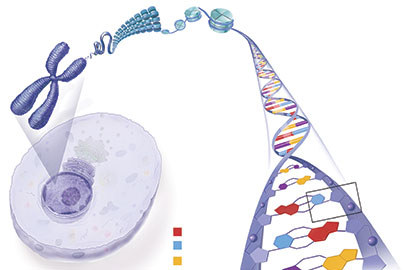
Precision Genomics Clinic
The goal of precision genomics clinic is to provide answers for individuals and families with rare genetic conditions that are going through diagnostic Odysseys. We do this by using state-of-the-art whole genome sequencing. Individuals with a wide range of conditions from childhood to adulthood are seen in this clinic. This clinic serves as a clinical base for discovery and translational science research. We use the existing clinical data as well as identify new individuals to establish a bio bank linked to de-identified patient data. We study our unique patient population for gene discovery projects, and are prepared to be centers for clinical trials. This will serve as our discovery cohort for additional collaborative research.
-
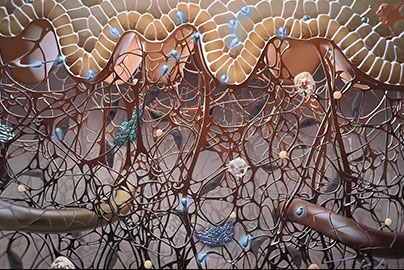
UC Davis Connective Tissue Disease Clinic
The UC Davis Connective Tissue Disease Clinic provides diagnostic evaluations for patients with genetic forms of connective tissue disorders. These may include the Ehlers-Danlos syndromes, Marfan syndrome, Loeys-Dietz syndrome, genetic aortopathies, cutis laxa, osteogenesis imperfecta, and skeletal dysplasias.
-
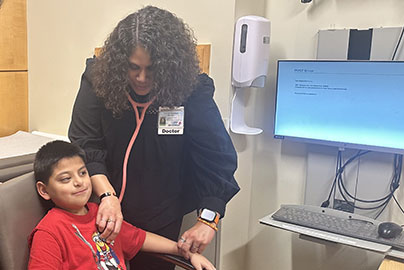
Vascular Anomalies Clinic / Vascular Genomics Clinic
The Vascular Genomics Clinic provides genetics evaluations to individuals with a personal or family history of vascular malformations or segmental overgrowth that are or may be genetic. Clinical findings that may suggest a genetic vascular malformation or somatic overgrowth condition include cutaneous capillary malformations, venous malformations, mucocutaneous telangiectases, arteriovenous malformations, lymphatic malformations, somatic overgrowth or hemihypertrophy, cerebral cavernous malformations. Conditions seen in this clinic include (but are not limited to) Hereditary Hemorrhagic Telangiectasia, Sturge-Weber Syndrome, Proteus Syndrome, and PIK3CA-Related Overgrowth Spectrum.
These conditions are characterized by differences in the veins, arteries, and capillaries that may be hereditary or post-zygotic (non-hereditary). Most genetic vascular and/or overgrowth conditions cause discolored skin lesions but they may also affect other organs such as the lungs, brain, and liver. Lesions in these tissues may cause bleeding, shortness of breath, or even stroke. Our comprehensive evaluation includes a medical history review, an assessment of currently available genetic testing options, and results discussion with counseling considerations for patient and family. We work to provide patients and their families with information about the genetics of their condition, treatment options, management and surveillance guidelines, and referrals to other expert specialists who can help with managing their condition. Regular providers in this clinic include Daniah Beleford, M.D., Ph.D., clinical geneticist, and Annika Gillam, M.S., C.G.C., genetic counselor.
-

X and Y Chromosomal Variations Clinic
The X and Y Chromosomal Variations Clinic at the UC Davis MIND Institute is a multi-disciplinary clinic dedicated to providing personalized care for children and adults with a known diagnosis of a X or Y sex chromosome variation. Sex chromosome variations (also referred as sex chromosome aneuploidy) involve variations in the typical number and type of sex chromosomes (the X and Y chromosomes). Sex chromosome variations include Klinefelter syndrome (47, XXY), 47, XYY, Trisomy X (47, XXX), 48, XXYY or other related X or Y chromosome variations.
Our team provides comprehensive, collaborative assessment and personalized treatment planning. Our dedicated team of providers includes pediatric and adult endocrinologists, pediatric and adult geneticists, developmental-behavioral pediatricians, genetic counselors, and a social worker. We are proud to be a member of the AXYS Clinic and Research Consortium (ACRC) and our providers have both clinical expertise and research interest in working with individuals with sex chromosome variations. Regular providers in this clinic include Kristen Wigby, M.D.; Daniah Beleford, M.D., Ph.D.; Samantha Runa, M.S., M.P.H.
Contact Infomation
The goal of the Genomic Medicine Division at UC Davis is to help improve the quality of life for individuals, both children and adults, and family members of individuals with genetic disorders through clinical care, research, and education.
MyUCDavisHealth - Previously called MyChart, this tool helps to empower you to play an active role in your care and well-being. It's part of UC Davis Health's ongoing commitment to use innovation, technology and partnerships to advance health.
Genomic Medicine Clinic
2825 50th Street
Sacramento, CA 95817


